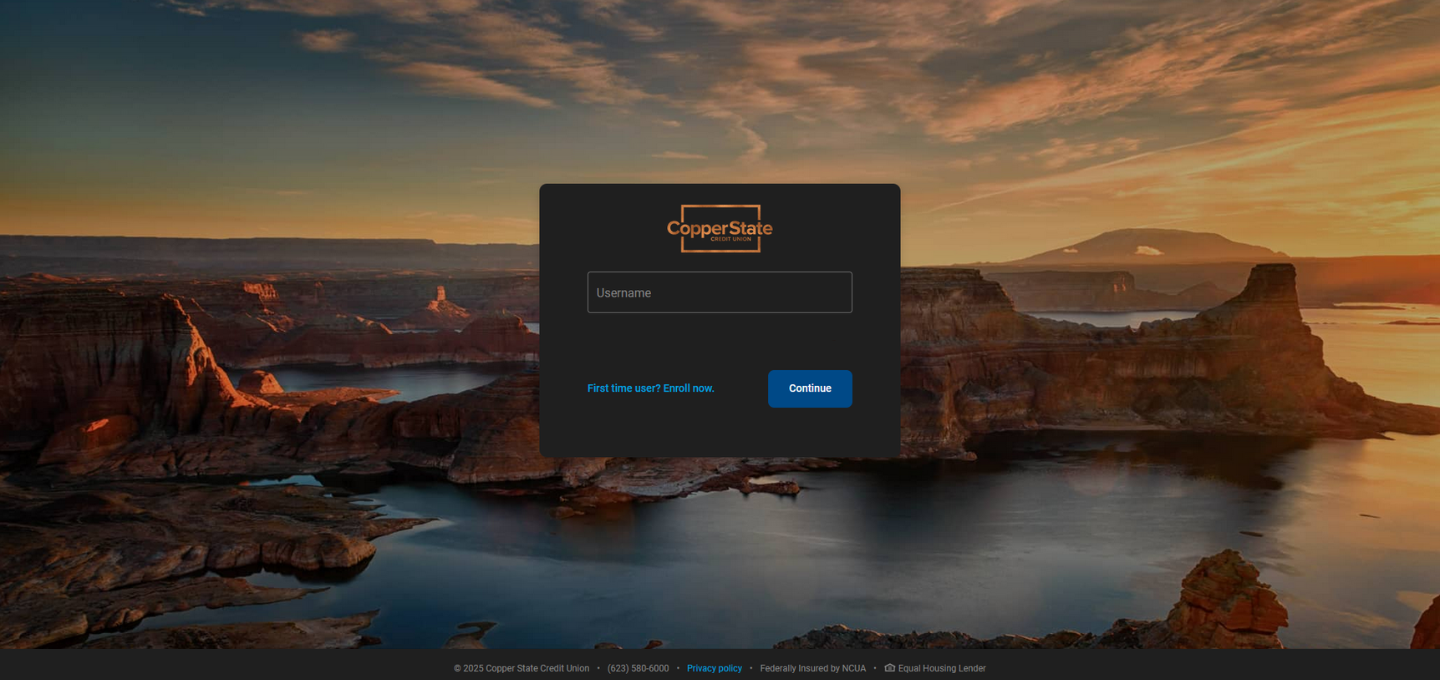Top 4 Account Security Alerts You'll Want to Turn On
If you're not already using security alerts for your bank and credit union accounts, here's a quick summary of why you should be, as well as which alerts our members find most helpful. 💡
What Are Account Security Alerts?
Most financial institutions have an option for you to enroll in text, email or push notifications if a specific activity occurs on your account. You choose between several options - notification of a transfer from checking to savings, mobile check deposit notifications, ATM use notifications, and many others. Here, we'll highlight the top security alerts our members are currently using to keep their money safe while banking online.
Here's where to manage security alerts from Copper State CU mobile banking:
Select 'Enhanced Account Alerts' from your menu of options. This will take you to the following screen:

Welcome to your Account Alerts Manager! Here, you'll be able to enable and disable alerts.
As you can see, you have the option to turn alerts on for your account, share(s) and loan(s). There are even a few extra 'Available Alerts' that offer additional notifications like when you have a birthday.
Feel free to explore all of the opportunities you have to be alerted. Under each selection, you'll have the chance to choose how you want to be alerted. Whether you prefer text messages, emails, or push notifications, be sure to select "save" after making any changes.

Life Hack: Do you know that you have a specific preference in notifications? Let's say you're tired of receiving emails and only want to be notified via text message. To update delivery methods for all of your alerts, select 'Default Delivery' and choose your phone number.

Most Popular Alert: Deposit Transaction Alert
Clearly, knowing when money lands in your account is going to be high on the priority list. Although it's not necessarily a security issue to know when you get paid, it might make a big impact on whether you make that trip to Costco today or wait a week. 😅
Even though most companies have shifted from paper paychecks to direct deposit, there's still a desire for that feeling of someone handing you your paycheck for a job well done. That's where our most popular security alerts comes in. You have the ability to choose which account you'd like to monitor (for most of us, our direct deposit is going into a checking account) and you can set it to detect any deposit above a certain threshold.
- Select your checking account under 'Share Alerts.'
- We recommend choosing from the three highlighted options below!
Best Fraud-Fighting Security Alert: Withdrawal Transaction Alert
If you use your debit card a lot, you might think that it would be annoying to get a text message or email every time the debit card is used. But it's more annoying to have someone steal your debit card or your identity and make purchases pretending to be you! That's why so many of our members are signed up for debit card transaction alerts— no one wants to become a victim of debit card fraud.
P.S. If you or someone you know is suffering from identity theft, check out our exclusive Identity Theft Protection Checklist to help you restore your financial security and identity.
Whether you're wanting to keep tabs on your spending or make sure your debit card never gets compromised, it's a good choice to explore these alerts and choose one that makes sense for you.
Tip: Many fraudsters will make a very small 'trial' purchase with a stolen card number to see if it works and test the waters to see if you'll notice. That's why it makes sense when setting up debit card transaction security alerts, to have the minimum amount be $0.01.
Check out the alerts and tips below that might help you pinpoint fraudulent activity!
Another Great Fraud-Fighting Security Alert: Online Banking User Alert
If someone logs in to your online banking account, would you want to know? Of course! This security alert is an easy way to keep tabs on your online banking login sessions. If it's not you who is signing in, and you get a text or email alert that someone is accessing your online banking, this is like a "Potential Identity Theft!" alarm that you can immediately take action on by changing your password and contacting your institution. Here's how to toggle this alert to 'On.'
Btw... starting off with strong passwords can prevent your accounts from getting breached.
- Select your name on the bottom left of your main navigation menu.
- Choose 'Personal Settings.'
- Then, select 'User Alerts.'
With these tools, you'll know for sure if someone is trying to access your account.
Another indication of a breached account is if you receive a multi-factor authentication request and it wasn't you who initiated the log-in to online banking. Check out our Fraud Help Center for more information on how to keep yourself and your money safe!
Most Helpful Security Alert: Balance Alert
If you've ever lost track of how much money is in your account (🙋) this security alert will be a big help. Basically, you set it to alert you of all current balances. Or, if you only want to be notified of one account, simply click into that specific share or loan. You can select the frequency of these alerts depending on when you want to know your balance. Check it out!


Perhaps you only want to be notified if your account ever goes below a certain dollar amount. You would do this on the account level! 👇

For some, a good number might be $10, for others, it might be higher. It's a nice early warning to let you know if your balance reaches a critical (to you) level.

Conclusion
So, what's your favorite security alert? If you aren't enrolled in online banking yet, do it now! This will unlock all of your alerting capabilities and help keep you in-the-know for the important stuff like your credit score.
More Resources on Keeping Your Money Safe 👇
- Top Money Scam: Card Cracking
- How to use Zelle® to Safely Send Money
- Online Financial Wellness Games for Kids and Teens
- Can I Get My Money Back After Sending it with Zelle®?
This article is intended to be a general resource only and is not intended to be nor does it constitute legal advice. Any recommendations are based on opinion only.





